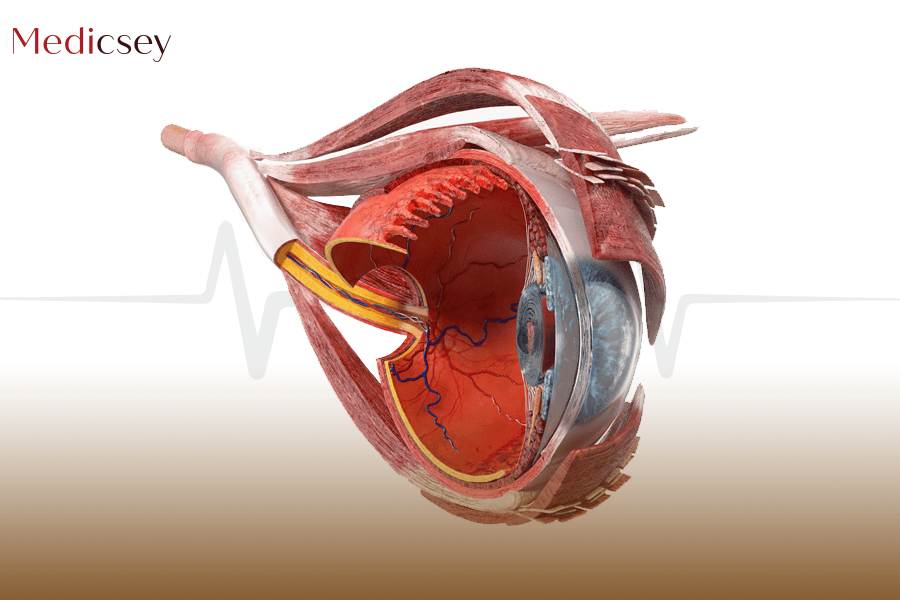The retina transmits the image of the outside world through the optic nerve to the brain. in this article we will talk about retina in Istanbul and its diseases.
Table of Contents
Retinal detachment
It is when the retina, which is located at the back of the eye, moves from its normal place, which is an emergency that requires treatment as soon as possible. It can cause vision loss in the affected eye if retinal detachment is prolonged without treatment.
When retinal detachment occurs, retinal cells separate from the layer of blood vessels that feed them with oxygen and nutrients. Fortunately, retinal detachment is preceded by some warning signs of retinal detachment, such as flashes and decreased vision.
Causes of retinal detachment
Retinal detachment can be caused by several factors, including:
Aging: The body loses its ability to repair tissue well, which leads to retinal deterioration and increases the likelihood of retinal detachment.
Injury: such as strong trauma that leads to eye shaking, or sports injuries involving sudden changes in intraocular pressure.
Diseases and health conditions: such as diabetes, keratitis, high intraocular pressure (glaucoma), eye infections and some genetic diseases
Genetic factors: Tendencies to retinal detachment can be inherited and especially in family members with this problem.
Risk factors for retinal detachment in Turkey
The following factors increase your risk of retinal detachment:
- Aging – retinal detachment is more common in people over the age of 50
- Previous retinal detachment in one eye
- Family history of retinal detachment
- Excessive myopia (myopia)
- Previous eye surgery, such as cataract removal
- Previous acute eye injury
- Other previous eye diseases or disorders, including retinal fissure, uveitis or thinning of the outer edges of the retina.
Symptoms of retinal detachment
If a small part of the retina is detached, the patient may not show any symptoms. but as a larger part of the retina is detached, the vision is affected and many symptoms appear, such as:
- Sudden appearance of gray or black floaters or spots in the field of vision.
- A flash of light appears in both or one of the eyes.
- The appearance of a dark shadow on the sides or middle of the field of vision.
If one of these symptoms appears, you should go to an ophthalmologist or emergency room immediately. and if not treated immediately, more retina may detach, increasing the risk of permanent vision loss or blindness.
Complications of retinal detachment
The complications of possible retinal detachment are as follows:
- Cataract formation, which leads to loss of vision in the lens of the eye.
- Glaucoma, which is high intraocular pressure.
- Infection.
- Low vision.
- Bleeding in the eye cavity.
- Temporary vision loss.
In addition to the complications mentioned above, some long-term risks may result after retinal detachment. which is total vision loss, but this is rare under the use of modern surgical techniques.
Diagnosis of retinal detachment in Turkey
There are some tests to diagnose retinal detachment in Turkey:
- A natural eye test to measure your vision and ability to distinguish colors.
- Retinal examination using a tool with a bright light and special lenses to examine the back of the eye, including the retina.
- Ultrasound is used if bleeding occurs in the eye, making it difficult to see the retina.
- Examination of intraocular pressure and blood flow throughout your eye, specifically in the retina.
- Your doctor's test of your retina's ability to send nerve signals to your brain.
Treatment of retinal detachment in Turkey
- It is necessary to treat retinal detachment because one of the important consequences of neglecting treatment. for retinal detachment is irreversible vision loss due to retinal atrophy. or chronic visual inflammation, leading to complete atrophy of the eye.
- Surgical treatment is always the choice to repair the lacerations. and holes that cause the retina to detach by laser or a cold retinal probe to restore the retina to its position. as it works to push the back wall of the eye from the outside towards the retina.
- This is done by hanging silicone tapes or parts or removing the glass part. and introducing silicone gas or oil into the vitreous cavity. and the operation is carried out under the influence of local anesthesia and does not need to keep the patient in the hospital.
Step by step with retinal detachment in Turkey
The method used to perform retinal detachment surgery in Turkey varies according to the damage to the retina and the size of its rupture. The method of anesthesia varies depending on the patient and it is possible to complete the operation under local anesthesia or resort to general anesthesia. Especially in children or patients with severe stress. The doctor determines the most appropriate method for retinal detachment, such as:
The use of laser surgery.
Cooling, gas injection or glass liquid.
Resorting to stitches through solid tangles to prevent their separation for a second time.
We have shed light on everything related to Retinal Detachment Surgery in Turkey. For more information about Retinal Detachment Surgery in Istanbul . You can seek a free and instant consultation by the best orthopedist in Turkey. You can book an appointment to visit Medicsey Center using our website. With its medical staff with more than 30 years of experience, it strives to provide the best results at the best acceptable prices.










